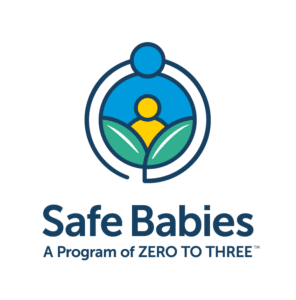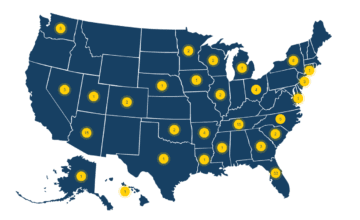
Every 10 minutes, a baby or toddler is removed from their family due to alleged maltreatment or neglect.
This is alarming because the first three years of a child’s life are crucial. In communities across the country, families are striving to give their children a good start in life. They share a common desire for their babies to be healthy, happy, and safe, but also face major obstacles; including economic insecurity, material hardship, and extreme stress. Additionally, adverse childhood experiences (ACEs) like trauma, community violence, physical and mental health issues, and substance use disorders can further exacerbate these challenges for parents.
This reality propels our big vision and bold approach – Safe Babies, a Program of ZERO TO THREE™, ignites collective action in state and communities to transform child welfare into the practice of child and family well-being by strengthening families and preventing the need for babies and toddlers to be removed from their homes.
We all have a responsibility to prevent child adversity.
We include parents as leaders in our work, honoring their resilience and lived experience.
Our goal is to reframe the narrative from individual parent responsibility to our shared responsibility to build strong, connected systems that support families. Together, we can create a better today and a brighter future for all children, starting from their earliest years.
Children under the age of 3 enter the child welfare system more than any other age group.
The Safe Babies Approach
The goal of the ZERO TO THREE’s Safe Babies approach is to prevent maltreatment and neglect of babies and toddlers and to keep families together.
Our innovative and nationally recognized team-based approach ignites collective action across states and communities by using the science of early childhood development to meet the urgent needs of all families.
We know that young children thrive best when surrounded by responsive and caring adults. Safe Babies works to reduce the overbearing load of stress for families. Through our work, we help professionals understand the weight of economic, social and health hardships, domestic violence, and mental health disorders have on families and how that can affect the early relationship parents develop with their babies and toddlers.
We work to build coordinated and aligned early childhood systems that help families flourish and thrive.
A Bold Approach to Better Outcomes
The approach works concurrently, at the Child and Family Level, Site and Community Level and State Level, to ensure healthy childhood development while impacting long-term capacity building.

Achieving Sustainable Impact
Key Outcomes for Infants and Toddlers Supported by the Safe Babies Approach

The young child’s development is on a healthy track
Attachment relationships are nurtured and protected
Prevention of repeat child welfare involvement
The Safe Babies approach does not promote a universal solution for families or the child welfare system. Instead, it is customized to meet the specific needs of each state and community to center the social, emotional, and cognitive developmental needs of the baby.
We envision a society where the conditions in which families live, learn, work and play cultivate well-being, ultimately strengthening the family and preventing the need for any baby or toddler to enter the child welfare system.
Learn how we can support your community in its efforts to implement the Safe Babies approach.


Infant-Toddler Court Program National Resource Center
Child and family adversity is a public issue, a preventable problem, and a solvable problem.
We all have a stake and role in outcomes that matter for young children and their families.

